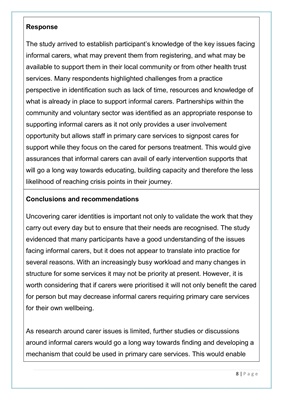
8 | P a g e
Response
The study arrived to establish participant's knowledge of the key issues facing
informal carers, what may prevent them from registering, and what may be
available to support them in their local community or from other health trust
services. Many respondents highlighted challenges from a practice
perspective in identification such as lack of time, resources and knowledge of
what is already in place to support informal carers. Partnerships within the
community and voluntary sector was identified as an appropriate response to
supporting informal carers as it not only provides a user involvement
opportunity but allows staff in primary care services to signpost cares for
support while they focus on the cared for persons treatment. This would give
assurances that informal carers can avail of early intervention supports that
will go a long way towards educating, building capacity and therefore the less
likelihood of reaching crisis points in their journey.
Conclusions and recommendations
Uncovering carer identities is important not only to validate the work that they
carry out every day but to ensure that their needs are recognised. The study
evidenced that many participants have a good understanding of the issues
facing informal carers, but it does not appear to translate into practice for
several reasons. With an increasingly busy workload and many changes in
structure for some services it may not be priority at present. However, it is
worth considering that if carers were prioritised it will not only benefit the cared
for person but may decrease informal carers requiring primary care services
for their own wellbeing.
As research around carer issues is limited, further studies or discussions
around informal carers would go a long way towards finding and developing a
mechanism that could be used in primary care services. This would enable